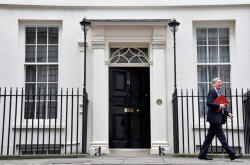UK think tank sees no easy solutions to UK fiscal woes
 Send a link to a friend
Send a link to a friend
 [March 14, 2018]
LONDON (Reuters) - Politicians
must stop deluding themselves that all is well for Britain's economy and
finances as it prepares to leave the European Union, the head of the
non-partisan Institute for Fiscal Studies said on Wednesday. [March 14, 2018]
LONDON (Reuters) - Politicians
must stop deluding themselves that all is well for Britain's economy and
finances as it prepares to leave the European Union, the head of the
non-partisan Institute for Fiscal Studies said on Wednesday.
Britain's public finances have performed better than expected over the
past year -- pushing borrowing to its lowest since 2002 -- but IFS
director Paul Johnson said politicians on all sides had not grasped the
huge challenges that lie ahead.
"The reality of the economic and fiscal challenges facing ought to be at
the very top of the news agenda," Johnson said in a speech in London.
"And I mean the reality, not the spin and bluster of politicians on all
sides pretending there are easy solutions, that the promised land is
just around the corner, or that they can reinvent the laws of
economics," Johnson said. "There aren't. It isn't. And they can't."
The IFS is widely regarded as a non-partisan arbiter of British fiscal
policy and its responses to government budget statements are closely
watched by national media.

Johnson's comments came a day after finance minister Philip Hammond
presented somber projections for the economy from the independent Office
for Budget Responsibility in a half-yearly budget update, but said he
aimed to surpass them.
OBR chairman Robert Chote was Johnson's predecessor as director of the
IFS.
The OBR's forecasts were little changed from November, when it
downgraded its medium-term outlook, mostly because productivity has
stagnated since the financial crisis, rather than specific concerns
about Brexit.
[to top of second column] |

Britain's Chancellor of the Exchequer Philip Hammond leaves 11
Downing Street to deliver his half-yearly update on the public
finances, in London, March 13, 2018. REUTERS/Toby Melville

Hammond's announcement on Tuesday that he would begin consultations on the
future of some taxes was welcome, but did not adequately address the problems
ahead, Johnson said.
Just to maintain public spending's share of the economy in five year's time,
Hammond would need to find an extra 14 billion pounds ($19.6 billion) a year,
Johnson said.
If Hammond also wanted to pursue his goal of eliminating the budget deficit by
the mid 2020s, Hammond would need to find another 18 billion pounds a year of
spending cuts and tax rises.
Demographic pressures on spending on health, social care and pensions could add
another 11 billion pounds a year by 2025, the IFS said.
In addition, Britain is becoming more reliant on a small number of high-earning
taxpayers to finance public spending. While this may be desirable in terms of
distribution between rich and poor, there are risks, Johnson said.
"If high-paid jobs - and EU citizens, who are well represented among high
earners in the UK - relocate elsewhere, the consequences for the exchequer will
be severe," Johnson said.
($1 = 0.7152 pounds)
(Reporting by Andy Bruce, editing by Larry King)
[© 2018 Thomson Reuters. All rights
reserved.] Copyright 2018 Reuters. All rights reserved. This material may not be published,
broadcast, rewritten or redistributed.
Thompson Reuters is solely responsible for this content. |